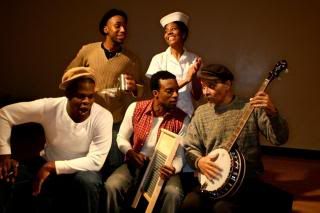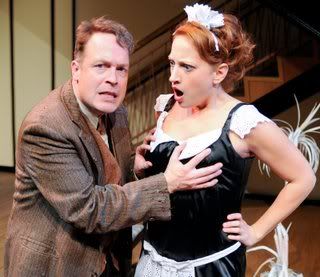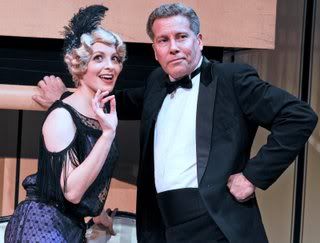David Feldshuh's Miss Evers' Boys has been around for 17 years, most notably in its 1997 Emmy-winning TV adaptation. But in the current production by the Red Fern Theatre Company it still feels as fresh as a spring rain.
The dazzling cast has something to do with this. Their superb performances, under the more than able direction of Melanie Moyer Williams, flesh out the disturbing story that Mr. Feldshuh's script tells so achingly.
Beginning in 1932, a government program which became known as the infamous Tuskegee experiment subjected a group of syphilitic African-American men in Alabama to a cruel study. Told they were being treated for their "bad blood," they were in fact denied treatment. The crude medicines of the time — and later, more egregiously, the lifesaving new drug penicillin — were withheld from the men, so doctors could study the ravages of the disease over time and determine whether blacks and whites were affected the same way.
Given this nightmarish scenario, with its numerous victims and its overtones of eugenics, the script is remarkably evenhanded. Feldshuh's central insight was to focus on the character of Eunice Evers, a selfless nurse who, believing she is doing her best for the men, wins their trust and cares for them through their years of illness and suffering. Framing the action, which takes place at the outset of the study and then fourteen years later, are snatches of Nurse Evers' testimony before Congress in 1972 when the whole horrid affair came to light.
Played with the utmost grace by Nedra McClyde, who was excellent in Victor Woo and TBA and gets a well-deserved central role here, Nurse Evers initially trusts the doctors running the study. She is so strongly animated by her calling that she never starts a family of her own; the men become her charges, and she comes to love them dearly. But as Nurse Evers loses faith and the anguish of her inner conflict grows, Ms. McClyde makes us feel both utter sorrow and powerful admiration for the character.
Though the racial attitudes depicted in the play are no longer dominant in our culture, the play remains vivid because its underlying themes are timeless. Conflicting loyalties and man's inhumanity to man never go out of style.  More specifically, evidence of our nation's painful racial history lingers everywhere. The play also has many old-fashioned virtues that have retained their effectiveness since the dawn of theater: lots of drama, painful scenes, funny ones, and colorful characters with complex personalities and distinct, sometimes exaggerated traits.
More specifically, evidence of our nation's painful racial history lingers everywhere. The play also has many old-fashioned virtues that have retained their effectiveness since the dawn of theater: lots of drama, painful scenes, funny ones, and colorful characters with complex personalities and distinct, sometimes exaggerated traits.
There's the sharp, mistrustful rebel, the high-spirited hoofer with dreams of stardom, the superstitious farmer quailing before the march of progress, and the illiterate elder with homespun wisdom. Played respectively by Garrett Lee Hendricks, Jason Donnell Bush, Marty Austin Lamar, and veteran David Pendleton, these men suffer separately and together through scenes of excruciating "treatment," joyful song and dance, agonizing decision-making, abnegation, struggle, and occasionally grace. They're a terrific ensemble, and each has beautifully-played individual scenes as well. The doctors too, both white and black, are, like Miss Evers, complicated people, dedicated professionals who believe they are doing right. They just can't see (in the case of the white doctor, played by Alex C. Ferrill), or overcome (in the case of the black doctor, played by the imposing Evander Duck), the twistedness of the situation in which they find themselves.
The stars seem to have aligned for this production: excellent actors perfectly cast, with a director who knows just how to seize on the strengths of Feldshuh's scenecraft. The show may be a little slow going at a few points and unnecessarily heavy on the pathos at the end, but the brilliant talent collected here has no trouble wiping the floor with these minor flaws. This Miss Evers' Boys is a triumph. It plays Thursdays through Sundays through April 5 at the Shell Theatre in the Times Square Arts Center, 300 W. 43 St. Tickets at Ovation Tix online or call 212-352-3101. A portion of the proceeds from this Red Fern Theatre Company production goes to benefit the Nordoff-Robbins Music Therapy Foundation. Photo by Nathan Johnson.





